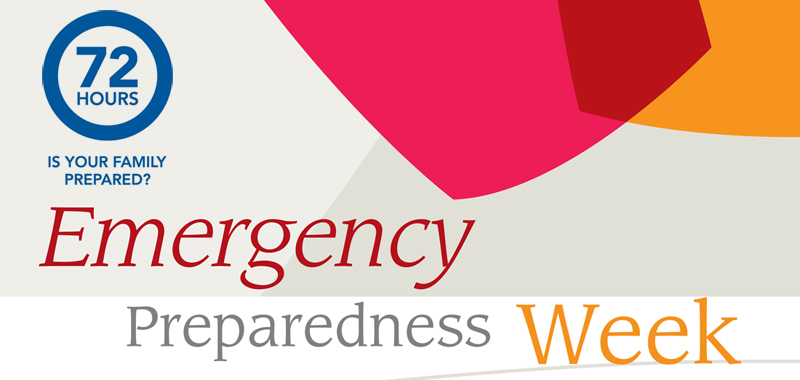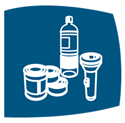Emergency Preparedness Week

Have you ever thought about how to prepare for an emergency? How would you:
- Look after yourself or your family for 72 hours?
- Cope without power or tap water?
- Contact your family and receive information?
Emergency Preparedness Week — May 4 to 10, 2014 — is a great time to take three simple steps to better prepare yourself and your family to face a range of emergencies:
 1. Know the risks
1. Know the risks
Although the consequences of disasters can be similar, knowing the risks specific to the Okanagan (like what to do in the case of a forest fire, flood, technological or environmental accidents such as chemical spills and power failures) can help you better prepare.
Learn about hazards and emergencies here in BC and across Canada.
2. Make a plan
Every student, staff and faculty member needs an emergency plan to guide them if disaster strikes. You should practice what to do in different emergency situations.
- Use your Emergency Preparedness Guide as an outline
- Photocopy your plan and keep copies in a safe and memorable place
https://www.youtube.com/watch?list=PLtXukVe8pplNPxF3pFs4TYssVJEqkaiPf&v=QrtM3fkbQ-U
 3. Get a Kit
3. Get a Kit
During an emergency, you may need to get by without power or tap water for several days. You will need some basic supplies (items such as three-day supply of water, non-perishable food, a flashlight, batteries, , battery-operated or wind-up radio, first aid kit, pocket knife, prescriptions, extra set of keys and money, and copies of important documents). Be prepared to be self-sufficient for at least 72 hours.
https://www.youtube.com/watch?list=PLtXukVe8pplNPxF3pFs4TYssVJEqkaiPf&v=37jZIdPbHBY
- Checklist for a basic 72 hours emergency kit
- Make a family emergency kit
- Emergency preparedness for people with disabilities or special needs
- Do you have a pet? Preparing for emergency for pets and service animals
Additional information
- Get Prepared website
- Emergency preparedness for people with disabilities or special needs
- Emergency preparedness for children
- Preparing for emergency – pets and service animals
- Prepare now for an earthquake in BC
- Environment Canada Weather Office: weatheroffice.gc.ca
- Safe Canada: safecanada.ca
- Canadian Red Cross: redcross.ca
- St. John Ambulance: sja.ca and earthquake safety tips
- The Salvation Army: salvationarmy.ca
- Get accurate info about earthquakes in Canada
- Need emergency supplies? Try stores such as Canadian Tire or Army & Navy or TotalPrepare.ca

Recent Comments